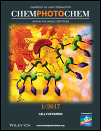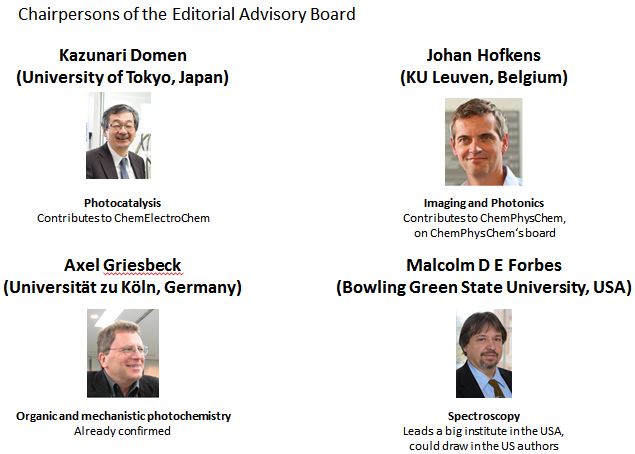New board members for the SCS Photochemistry Section
At it's Annual Meeting at University of Zürich, Irchel Campus on September 15, 2016, the Photochemistry Section of the SCS confirmed and elected the following board members for 2017 onwards:
- Silvio Canonica, Eawag Dübendorf − President (continuing)
- Pierre Brodard, HES-SO Fribourg − Member (continuing)
- Kurt Dietliker, BASF Basel − Member (continuing)
- Olivier Nicolet, HES-SO Fribourg − Member (new)
- Oliver Wenger, University of Basel − Member (new)
The Executive Committee will try and promote the organization of one-day photochemistry symposia on different topics and in different host institutions on a yearly basis. Ideas are gathered to possibly improve the concept, preparation, announcement and participation in such yearly scientific meetings. The Executive Committee will look for suitable hosts of such a meeting in 2017.
If you are interested in the complete minutes, please send a mail to Silvio Canonica ().
David Spichiger, SCS
10.11.2016
ChemPhotoChem is live!
 ChemPhotoChem is aimed to become a top-ranking photochemistry journal for primary research papers and critical secondary information from authors across the world. The journal covers the entire scope of pure and applied photochemistry, the latter encompassing for example photovoltaics, photopharmacology, imaging, analytical chemistry, and synthesis.
ChemPhotoChem is aimed to become a top-ranking photochemistry journal for primary research papers and critical secondary information from authors across the world. The journal covers the entire scope of pure and applied photochemistry, the latter encompassing for example photovoltaics, photopharmacology, imaging, analytical chemistry, and synthesis.
ChemPhotoChem is published on behalf of ChemPubSoc Europe. It will have 12 issues in 2017. Language of Publication is English.
Wiley-VCH Verlag GmbH & Co. KGaA
03.08.2016
Register for the 5th HRSMC Photochemistry Summerschool 2016
5th HRSMC Photochemistry Summerschool on "Photochemistry, Fundamentals and Applications".
August 27-31, 2016. Maastricht, The Netherlands
Dear Colleague
It is our great pleasure to announce our 5th HRSMC Photochemistry Summerschool on "Photochemistry, Fundamentals and Applications".
An advanced course covering various aspects of Photochemistry.
This school is the fifth in a series organised every four years by the Holland Research School of Molecular Chemistry, a cooperation between the Chemistry Departments of the University of Amsterdam, Leiden University, and Vrije Universiteit Amsterdam, under the auspices of the European Photochemistry Association.
This postgraduate school is intended for PhD students, Postdocs and interested scientists active in the field of Photochemistry, and for those who make use of photochemical or photo physical methods in their research. Specialised lectures by international experts will be preceded by a brief recapitulation of the basic aspects of molecular photochemistry and photo physics:
- Gary Brudvig: Solar Fuels
- Paola Ceroni: Supramolecular Photochemistry and Luminescence
- Edith Glaser: Inorganic Photochemistry for Therapy
- Stefan Hecht: Efficient phototransformations
- Johan Hofkens: Biophysical Chemistry and Microscopy
- Massimo Olivucci: Computational Photochemistry
A guest lecture on Photolithography will be delivered by Dr. Roel Gronheid (IMEC, Leuven, Belgium)
Early Bird Registration until June 16, 2016.
Members of the European Photochemistry Association (EPA) will receive a 20 Euros discount on the fee of our School.
Kind regards.
Fred Brouwer (University of Amsterdam/ARCNL )
Gert van der Zwan (Vrije Universiteit Amsterdam)
Sylvestre Bonnet (Leiden University)
Copyright © 2015. The European Photochemistry Association
David Spichiger, SCS
04.05.2016
European Photochemistry Association: Call for Nominations From Members
The Porter Medal 2016
Deadline for nominations: 31st January 2016
The Porter Medal is awarded every two years to the scientist who, in the opinion of the European Photochemistry Association, the Inter-American Photochemistry Association and the Asian and Oceania Photochemistry Association has contributed most to the subject of Photochemistry.
Named for the late George Porter FRS, Nobel Laureate the Porter Medal is awarded to the scientist who in the opinion of the judges, has contributed most the science of Photochemistry with emphasis on more physical matters, thus reflecting George Porter’s own interests.
To nominate European candidates for the Porter Medal 2016 candidates should preferably be sent directly to the President of the European Photochemistry Association. Dr David Worral . The nomination package should include.
Curriculum Vitae of the candidate
A list of publications
A citation for the award, not exceeding five pages in length
Two letters of reference
For the nomination of candidates from other continents, please see the Porter Medal Webpage: www.portermedal.com
EPA Prize for Best PhD Thesis in Photochemistry
Deadline for nominations: 31st December 2015
The Fifth EPA Prize for the best PhD thesis in Photochemistry will be attributed during the CECP 2016 Meeting in Bad Hofgastein, Austria. (February 13th to 18th). The prize is 1000 €, plus travel costs to Bad Hofgastein (within the limit of 300 €), and ONE FREE YEAR of EPA membership.
The candidate must have defended their PhD thesis in 2014 or 2015 and be nominated by an EPA Member. Nominations for this prize are now open and all nominations should also be sent directly to . The nomination package should include.
Curriculum Vitae of the candidate
Copy of the Thesis
Abstract of the thesis in English of no more than five pages in length
A list of publications arising from the thesis
A letter of support
http://www.photochemistry.eu/phd_price.php
David Spichiger, SCS
17.11.2015
Annual Meeting of the Swiss Photochemistry Section, Sep 8, 2015
On behalf of the Swiss Photochemistry Section I would like to draw your attention to a new initiative of our Section. Starting this year, we will organize a one-day meeting to promote the exchange within the photochemistry community in Switzerland.
This year’s
Annual Meeting of the Swiss Photochemistry Section 2015
will take place on 8 September 2015 at ETH Zürich.
Organizer: Prof. Kris Mc Neill, ETH Zürich
Co-organizer: Dr. Silvio Canonica, Eawag, Dübendorf
The meeting will comprise scientific contributions from any area of photochemistry as well as three invited lectures on the topic of Environmental Photochemistry. We envision that future meetings will feature different topics chosen by the host site organizers. The General Assembly of the Section will also take place during the meeting.
For more details please visit the website of the SPS Annual Meeting 2015.
Best regards,
Silvio Canonica
President of the Photochemistry Section
Division of Chemical Research
Swiss Chemical Society
Water Resources and Drinking Water Dept.
Eawag
Ueberlandstrasse 133, P.O. Box 611
CH-8600 Dübendorf, Switzerland
Phone: +41-58-765 5453
e-mail:
Page 280 of 299

